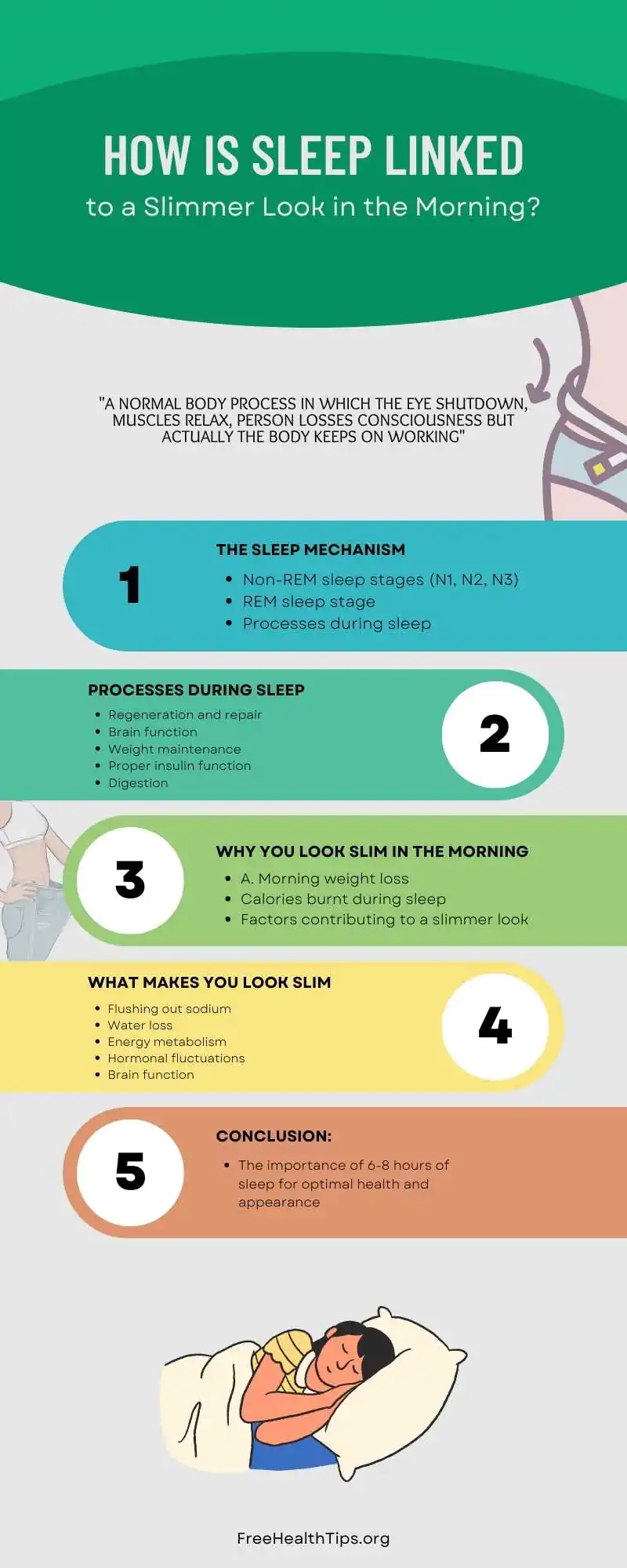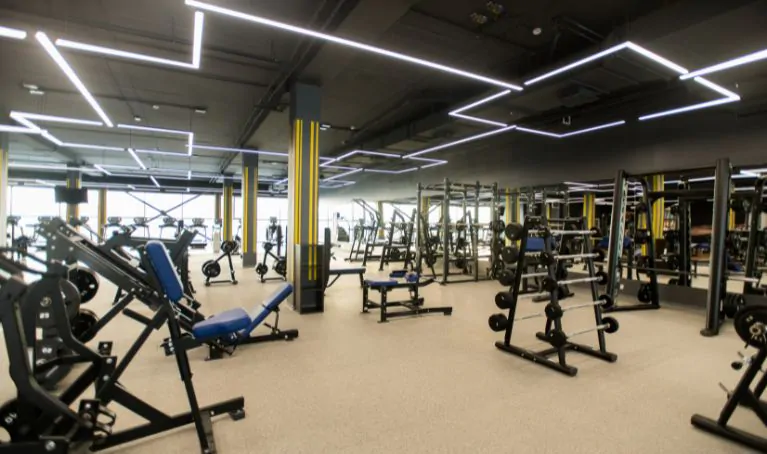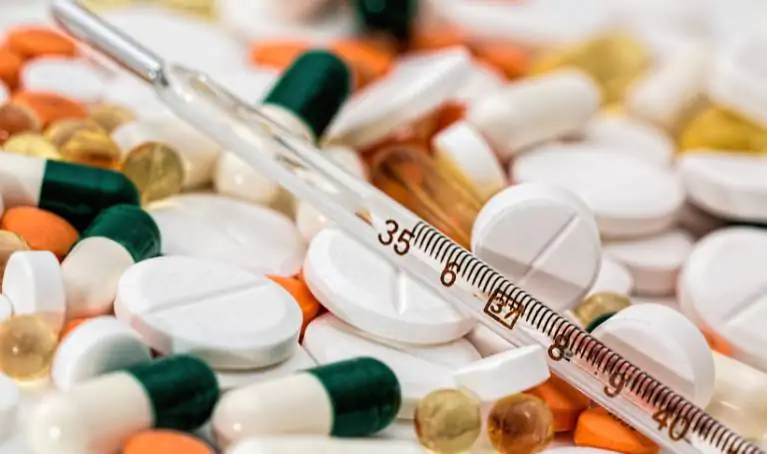“A normal body process in which the eye shutdown, muscles relax, person losses consciousness but actually the body keeps on working”
Yes, you heard correctly, the body is fully active, and it continues to perform its function like digestion, respiration, metabolism, and many others.
What Happens When You Sleep?
There are multiple functions being performed at the cellular and organ level that uses up energy and makes you look slimmer and smarter in the morning. If you have ever heard about basal metabolic rate termed MR of a person, it refers to the energy consumption during rest. What it indicates is the amount of energy when a person is not performing any daily life activity, it is also the energy being used up when the person is asleep.
Related: Unraveling the Mysterious of Dinosaur Hands Sleeping Position
Sleep Mechanism
The mechanism of sleep makes us look slim in the morning because sleep is a multi-stage process that is a continuous process comprising various energy-consuming processes.
It comprises of following four stages along with mechanisms that occur
- Non-REM sleep is a time when the person has just fallen asleep. It is N1. During this time, the person may wake you easily. There are rare eye movements and brain activity.
- N2 non-REM sleep has the most considerable sleeping time and a person can easily wake up if disturbed. There is no notable metabolism that occurs in the body during this time and body temperature falls.
- N3 non-REM sleep is the stage where all the essential body functions take place during this time.
- The immunity gets strengthened. Tissue growth and repair take place. Energy breakdown from food occurs during this period. Other health-promoting mechanisms include cell regeneration processes.
- REM sleep, the final stage of sleep is the time when we dream vividly. The body gets paralyzed to some extent but may experience cramps and twitches. During this time, brain activity increases trifold. All the brain-related functions and activities occur during this time using up glucose as a source of energy.

Processes During Sleep:
The processes that occur when the person is asleep are:
- Regeneration and Repair
“When you are asleep, the body is in the reboot process.”
This line clearly states that the body also needs time to restore and repair itself. It occurs when you are sleeping.
This happens through a series of processes that involve protein synthesis, hormone release, tissue growth and repair, and muscle repair if they have undergone wear and tear during the day. For example, if you have put a strain on your body, been involved in strenuous activities, engaged in strength training, or have done more work than your calorie intake, the body repairs itself naturally during the night.
Sleep boosts your brain function and allows it to work more efficiently. Ever noticed that you are drained and tired and you take a nap of as minimum as 15 minutes and suddenly you get charged to do the work again? This miracle is called sleep which helps your neurons and nerve cells reorganize and reenergize.
Optimal hours of sleep i.e., 6 to 8 hours helps your memory strengthen and convert short memory to long-term memory. All the rain activities like thinking, memory conversion, and coordination require energy.
- Weight Maintenance
Weight is efficiently managed by sleeping on time and following a regular sleeping pattern. This helps you look fresh and slim in the morning. The hormones responsible for being hungry and full are leptin and ghrelin, they are controlled by regular sleep cycles. Hence sleeping controls weight and helps you eliminate the chance of developing chronic disorders like obesity, cardiovascular diseases, and diabetes.
- Proper Insulin Function
Insulin released from the pancreas is basically responsible for the uptake of glucose by body cells and conversion to energy. Sleeping makes the cells more readily efficient to take up glucose and use them as energy. This overall improves glycemic control and ultimately improves the symptoms and complications caused by obesity.
- Digestion
Food digestion also uses energy, as your body breaks down your meal into usable fuel for the following day. All these functions help the body burn calories during the night.
Why Do You Look Slim in the Morning?
“Not only do you look slimmer in the morning, but you actually weigh less, too.”
Have you ever wondered why d dietitians and nutritionists ask you to weigh yourself in the morning? This s because, after a good hour of fasting state and no eating pattern, the body is light and actually weighs less. All the water has been flushed out. There is no water and fluid retention. So, the early morning weight is perfect and accurate.
The Number of Calories Burnt
The calories are burnt at 60 kilocalories per hour. So if you are sleeping 8 hours per night, the calories burnt are 480 calories you are easily able to reduce 0.5 pounds of body weight. Only this is the reason you appear slim in the morning.
What Makes You Look Slim:

- Flushing out Sodium:
Have you ever noticed that you consumed a salty meal or rice platter in the night and woke up feeling bloated? This happens when the salt gets retained in the body because the water is not enough to eliminate the salt or sodium specifically.
But most of the time, you wake up feeling light when you are properly hydrated. It happens because water acts as a carrier for the removal of sodium. When there is enough water available, the extra sodium is excreted out from the body making you feel light and weigh less actually rather than only looking slim.
- Water Loss:
Waking up in the middle of the night, with the urge to urinate, is the healthiest of mechanisms. This happens as the body eliminates the excess water that you have drunk throughout the day. Along with water, certain harmful toxins and chemicals are also excreted out. If retained in the body, they may prove to deteriorate. So, when eliminated during the night they help you weigh less and appear smarter.
- Energy Metabolism:
Another important mechanism to note here is that the body is continuously working at night to convert the food you consumed the previous night, not energy. This is done by various organs of the digestive system that leads to energy liberation.
The energy liberated is then readily consumed by all the organs of the body and thus burns calories too. The number of calories burnt in different individuals is different depending upon their body condition and metabolic rate.
- Hormones:
Various hormones are released on daily basis. The fluctuations in the amounts of hormones in the body occur during nighttime mostly when the body is at rest. All the changes like the increase in progesterone and estrogen occur during the night causing various changes in emotions and body energy levels in females. When you wake up the next day, you might feel yourself an entirely different person.
Apart from these, the hormones leptin and ghrelin linked to appetite and fat and adipose tissues also get disturbed when we are not sleeping at night. This leads to the night-eating syndrome. The person eats abnormally and craves junk food at night which leads to obesity and health problems.
- Brain Function:
As we understand the brain only accepts glucose as the energy source and fuel. When indulged in deep sleep i.e., REM sleep, the brain activity increases trifold. This is the phase where the energy reserves of the body are used up.
The glucose stored as glycogen is broken down and supplied to the brain for use as fuel. This helps in memory retention, boosting brain function and cognitive development of the brain.
All these activities help you look smarter and slimmer when you first look in the mirror in the morning.
Also Read: Why Do I Feel High When I’m Not: The Reasons and Solutions
- Fat Breakdown:
There are moments when glucose is not readily available for consumption by the brain, here comes the role of fats, the stored fats. Those fats, that are stuck in your body for such long periods, and you are unable to get rid of them, are broken down by a process called lipolysis and converted into glucose so that the brain can consume them. This ultimately makes you look slim because the fats have already broken down.
In a Nutshell
In the end, we conclude that it is not a myth but a fact that we not only look slimmer in the morning but also weigh less. Weighing less means the scale shows decreased weight and lesser inches and reduced fat mass. All these debates imply that when we get a good sleep at night it helps our body perform its normal functions with ease and the body is in a relaxed state.
When we lie down, the organs are at rest and the breakdown processes take place properly. Disturbing the natural biological clock of the body i.e., sleep leads to disturbed body functions, hormones, and ultimately our health declines. So, if you are body weight and shape conscious, you should take your beauty sleep of 6 to 8 hours and wake up fresh and slim!
FAQs
Looking Slim in the morning? Reasons?
Well, it’s not uncommon for people to wake up feeling slim and svelte in the morning. But why does it happen? Did you know that sleeping burns calories? It’s true! So, while you’re catching some Zs, your body is busy burning off those late-night snacks you regretted eating. That’s why you might wake up feeling a little slimmer than usual.
Also, even if you’re not consciously doing yoga in your sleep, your body might be. When you’re lying down, your muscles are relaxed, which can help stretch them out and release tension. This can make you feel more limber and flexible when you wake up, and might even help you appear slimmer.
Of course, the real reason is probably a combination of factors, including things like hydration levels, diet, exercise, and genetics.
How is sleep linked to weight?
Sleep is like a personal trainer for your metabolism: Just like a personal trainer helps you build muscle and burn fat, sleep helps keep your chonky metabolism in shape. When you skimp on sleep, your metabolism gets lazy and starts hoarding calories instead of burning them.
Sleep is like a bouncer for your hunger hormones: Imagine your hunger hormones (ghrelin and leptin) as rowdy party guests. When you’re well-rested, your sleep hormones (like melatonin) act like bouncers, keeping your hunger hormones in check. But when you’re sleep-deprived, those hunger hormones can run wild, leading to overeating and weight gain.
Whether you think of it as a personal trainer, a bouncer, a superhero cape, or a secret ingredient, getting enough quality sleep is essential for maintaining a healthy weight and feeling your best.
Skinny Legs in the morning. Reasons?
Ever heard of the morning magic trick? Your legs play a disappearing act and look skinny in the morning! But don’t worry, it’s just because you grow a bit taller while you sleep. As you go about your day, your legs gradually return to their normal size with the help of all that walking and standing. So, it’s not a case of skinny legs, it’s just your body doing its thing.
Why do I appear fat at night?
The reason why some people may appear to look fatter at night is due to the accumulation of fluids in the body throughout the day.
Which is true weight morning or night?
Your true weight is always your morning weight. It is so because at that time the body is free of extra water. In contrast to this, there is much water and sodium retention at night which makes you weigh more. So always weigh yourself in morning to know your true weight.







